"The Hidden Forces that Shape Our Decisions"
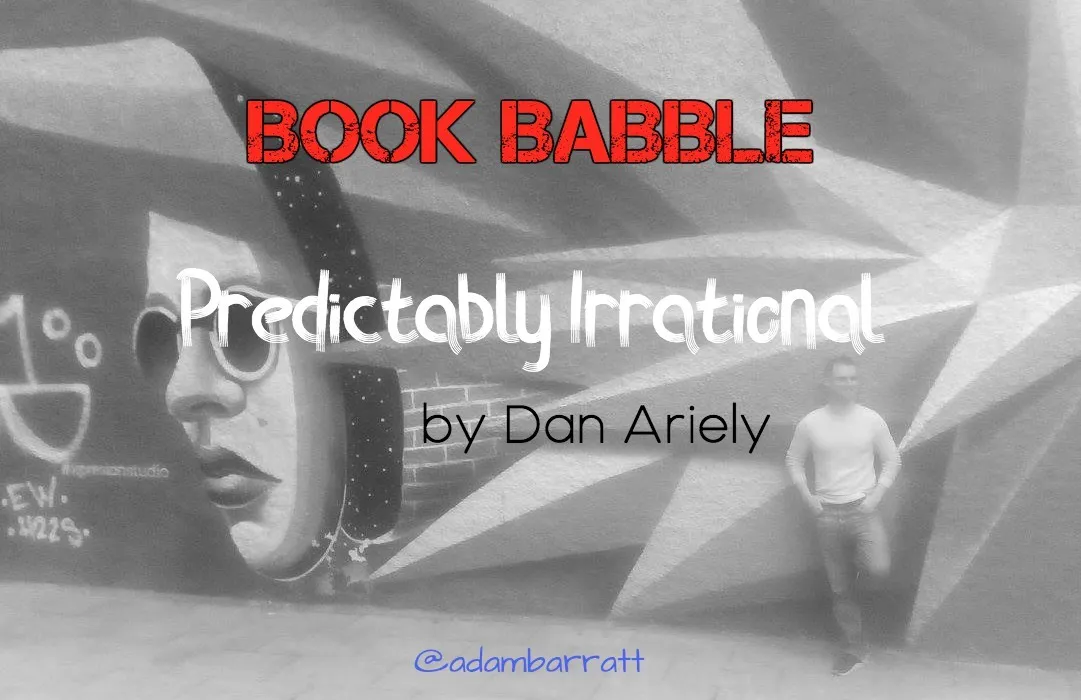
Here we have a great book on the decision making process… which just so happens to be predictable, and irrational!
How do we come to decisions? What are the influences? And why do we think and act the way we do?
The author, a professor of psychology and behahavioural economics, Dan Ariely sets about answering some of these questions and more.
I say we jump straight in and see what he has to say!
Top Takes! Some Great Quotes From the Book, Followed by My Additional Thoughts…
behavioral economics, or judgment and decision making (JDM)
This is the area we are dealing with and what the book delves into…
we are always looking at the things around us in relation to others
It's not just about us… we don't live in a vacuum or on an island. We are always taking everything around us into account which influences our thoughts, decisions and actions on multiple levels.
decoy effect
The decoy effect describes how, when we are choosing between two alternatives, the addition of a third, less attractive option (the decoy) can influence our perception of the original two choices. As in, they're going to look a whole lot better now and seem like a good deal in comparison. It sets expectations and puts things into a context.
15-minute trip to save the $7?
What's worth more? Would you go all the way across town to save a few bucks or is it worth paying the extra… then that time can be used for other things. This depends on multiple factors of course; how long is the trip, how much is saved, and what could have been done with that time and energy instead. This will also depend on your mood at a given time or further reasoning at play (you might just fancy the walk for example - so you could be a little healthier which would be a further gain).
relativity
It's all relative. How one item relates to another brings about a comparison and a context which in turn influences our decisions. It's how we figure out how to value things. What is it in relation to the other?
An obvious example is a reduced price sat next to what it was. It's now a 'good deal' despite potentially not being a better option to an alternative.
Relativity is a quick tool, but not necessarily the best. Marketers know that we may not want to dig deeper.
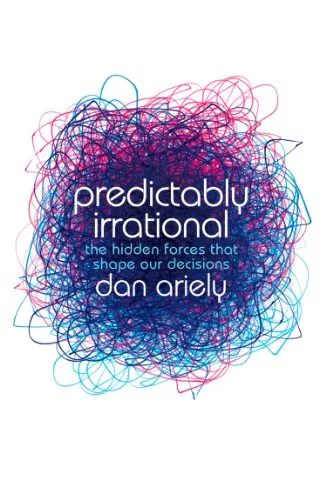
not only that goslings make initial decisions based on what's available in their environment, but that they stick with a decision once it has been made. Lorenz called this natural phenomenon imprinting
Imprinting is a form of learning in which a young animal fixes its attention on the first object with which it sees and experiences, and then follows that object. Might not just be Goslings!
price (which in academic lingo we call an anchor)
Anchors do exactly that: they put a price out there and you work out what's 'right' based on that. It gives a ballpark of what it 'should' cost. It's a starting point that may or may not be an accurate one and can be fairly arbitrary but we assume that's the general zone.
arbitrary coherence
This is similar to the previous quotes, in that a randomly chosen number influences the amount purchasers are willing to pay, much like anchoring.
our first decisions resonate over a long sequence of decisions
What we decide first will in turn influence our future decisions in a situation. There is a momentum in a given direction.
The difference between two cents and one cent is small. But the difference between one cent and zero is huge!
Having to pay something over a small increase is massive. There's a big leap going from nothing to someone handing over cash… but once the cash is out, a small increase is fairly easy to justify.
Money, as it turns out, is very often the most expensive way to motivate people. Social norms are not only cheaper, but often more effective as well.
You think it's a strong motivator and it is. But money isn't the be all and end all (more what feelings that can bring) and can be an expensive way of doing things. Getting people to fit in with the rest of society won't cost you so much and have a much stronger emotional drive.
sexual motivations
This is a very strong motivator whatever way we look at it, and bubbles under in one way or another.
emotional state
How you feel at a given moment is going to affect your feelings, perceptions and ultimately your decisions and actions.
endowment effect
This is where a person places a higher value on an object they own, than they would if they did not own it. A possession bias if you like. It's mine therefore more valuable, plus now there is a sentimental aspect to it.
That also brings loss version into effect. We focus on what we may lose, rather than what we may gain.
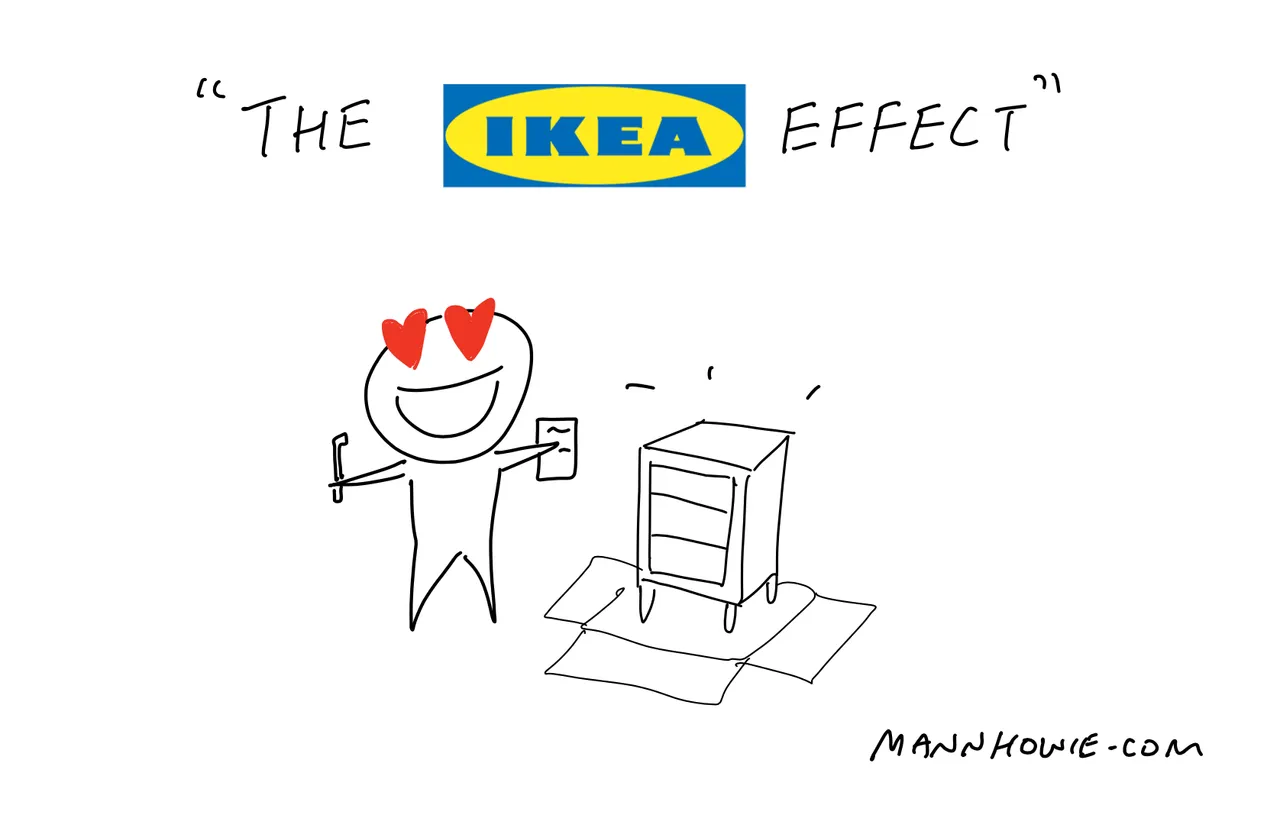
Ikea effect
You might be able to guess this one if you've ever constructed a masterpiece from your favourite Swedish furniture giant!
This is where we place more value on something we have built ourselves, ie. we've expended energy to create them, so we're very much involved. That time and effort is worth something after all, and we also have a sense of pride.
options
Often we have too many options which can derail us. A certain amount of choice has to be a good thing, but not to the point it clouds our judgements or paralyses action.
I've been meaning to read The Paradox of Choice which delves into this. In essence, it suggests that an abundance of options actually requires more effort to choose and can leave us feeling unsatisfied with our choice.
philosopher Erich Fromm wrote a book called Escape from Freedom
An interesting book and idea to check out. Can freedom be a burden? We think we want it, and seek it out… but when it comes to it, perhaps so-called freedom can bring its own shackles and not really be what we were looking for. Another paradox perhaps.
are we spreading ourselves too thin?
Not focusing on one or few things and concentrating our efforts. Being all over the place and not really advancing on anything.
wouldn't it be nice to have a built-in alarm, to warn us when the doors are closing on our most important options?
Deadlines. There's a time and a place for delaying a decision - allowing information to come to light and be mulled over thoroughly - but there also comes a point where a decision is made either way, and you go for it without looking back.
What we need is to consciously start closing some of our doors.
Instead of leaving the doors open so we have myriad options, it's time to slam them shut and go full force through the optimum ones.
choosing between two things that are similarly attractive is one of the most difficult decisions we can make.
It can be crippling as there's no obvious answer. The worst thing would be to do nothing. The best is to choose and have a great outcome. There will always be an opportunity cost with anything. The worst would be to do nothing and lose by all accounts.
consequences of not deciding
As I say, there are costs whichever which way you look. But in not deciding you are left in a hideous purgatory where everything is uncertain and you're unable to move forward.
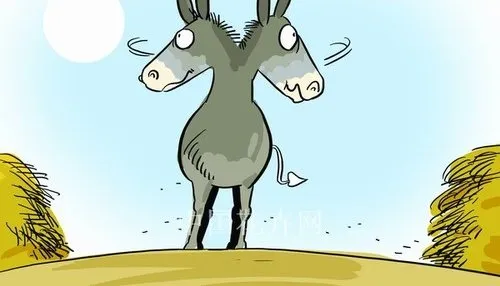
The French logician and philosopher Jean Buridan's commentaries on Aristotle's theory of action were the impetus of this story, known as “Buridan's ass.” The donkey stands in the middle of the barn between the two haystacks, not knowing which to select.
Here we go - Buridan's ass! This is an interesting story/concept that I think about occasionally…
This silly donkey is stood between 2 equal bales of hay at the same distance either side. Poor sod can't decide so ends up going nowhere and starves to death!
A classic example of both being equal, impossible to have both, but just picking one will allow survival and enjoyment.
determine whether people's expectations influence their views of subsequent events
They must do. If you have certain information before an event then it shapes expectations and you also have pre-existing ideas. The event now takes shape in that light.
Budweiser and the MIT Brew
A wacky experiment where they added balsamic vinegar to the second beer. When the students didn't know it, they loved the beer and preferred it to Bud… but with the prior knowledge, everything changed.
if you tell people up front that something might be distasteful, the odds are good that they will end up agreeing with you—not because their experience tells them so but because of their expectations.
Continues from above. You can also add in societal influence and what you 'should' be feeling.
stereotypes
Funnily enough, I just read a section on stereotypes in a book I'm reading at the moment (Thinking Fast & Slow). I'm not sure how Ariely refers to it here but in the general sense they have their place. They can be seen as 'wrong' in a fair and just society but have their place in psychology and science. Stereotypes group certain things together, which is useful… but can be inappropriate when assessing an individual. They're ultimately based on patterns of behaviour hence why they exist.
Placebo comes from the Latin for “I shall please.” The term was used in the fourteenth century to refer to sham mourners who were hired to wail and sob for the deceased at funerals.
Well I didn't know that was the origin!
placebos run on the power of suggestion. They are effective because people believe in them.
We spoke a lot about the placebo effect in the aptly titled You Are the Placebo by Joe Dispenza. Ariely discusses them here as they pertain to our behaviour and are such a strong influence, still not fully understood.
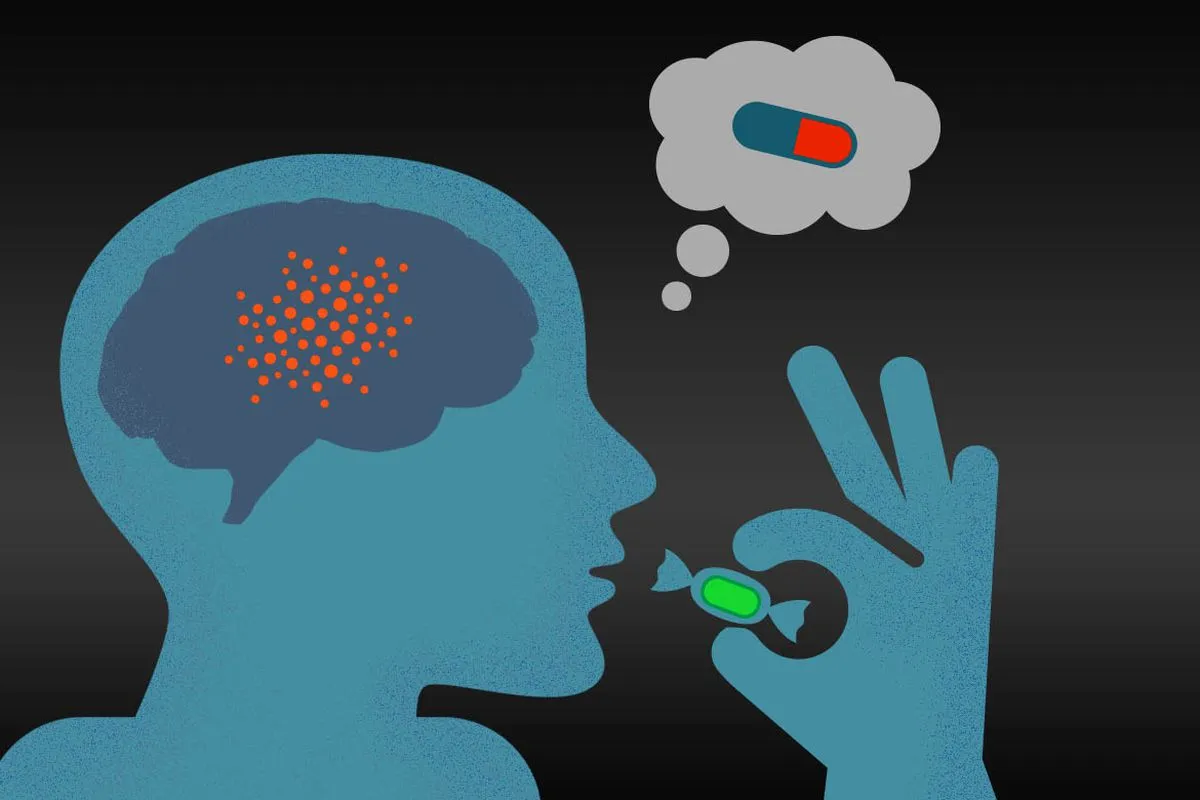
Two mechanisms shape the expectations that make placebos work. One is belief. The second mechanism is conditioning
Belief is the key. There are many methods to get there but it all comes down to the subject believing that what they've taken or what they're doing is going to work, this increasing the chances that it actually does, 'real' or not. This also states that conditioning is the other half of the equation.
would a cheaper painkiller be less effective than a more expensive one?
You see different priced paracetamol in the shops. Surely it's the same thing and it clearly states the dose. I guess some are more palatable in how they're shaped, taste etc along with other ingredients. Ultimately, they should do the same job if the drug involved is as potent.
At $2.50 almost all our participants experienced pain relief from the pill. But when the price was dropped to 10 cents, only half of them did.
An experiment on the above. Expectations once again influencing outcome. Even though they may be the same (exactly the same in this case, just the price change), the more expensive ones were perceived to be better and more apt to do the job. And that ended up being the case! (Or so it was believed by the participants).
there might be two types of dishonesty.
Now we delve into dishonesty. There is the obvious kind of thieves and the like doing their thing. Then the second type are things committed by people who generally consider themselves honest, doing some not so honest things.
since people engage in a cost-benefit analysis with regard to honesty, they can also engage in a cost-benefit analysis to be dishonest. According to this perspective, individuals are honest only to the extent that suits them (including their desire to please others).
Yeah, we're a bit biased. Some dishonesty is ok as we deem it. The situation has been assessed and balanced out.
cheating is a lot easier when it's a step removed from money
If you've not directly stolen then you aren't on the front line of the cheat. Once there are steps in between it almost doesn't count in our minds.
We found that when people order out loud in sequence, they choose differently from when they order in private.
Ordering food in a restaurant with other people at the table. The people ordering first may influence the order of the others, and if they didn't have that social influence then they would pick something different. We think that isn't the case and we use our own minds but this can impact more than we believe.
we are all far less rational in our decision making than standard economic theory assumes.
And this is the crux of the issue. We think it all makes sense and that we are in control. But… there lacks rationality in most things that we do, but paradoxically, this can easily be predicted!
Thanks Dan! Anything Else?
A lot to unpack and think about in that lot!
I'm currently reading Thinking Fast and Slow and this may tie in well. A similar offering in the assessment of behaviour.
Some fascinating ideas and it may help get to the bottom of why we do what we do. Ariely also has several TED Talks you can check out.
Have you read this book, and do you believe we are predictably irrational?
First image my own, others linked to source
Check out the others in the series…
- SHOE DOG - Phil Knight
- CRUSHING IT - Gary Vaynerchuk
- FINDING ULTRA - Rich Roll
- WOODEN - John Wooden
- RELENTLESS - Tim Grover
- ON WRITING - Stephen King
- START WITH WHY - Simon Sinek
- THE CHIMP PARADOX - Steve Peters
- ELON MUSK - Ashlee Vance
- WAY OF THE WOLF - Jordan Belfort
- THE SUBTLE ART… - Mark Manson
- GORILLA MINDSET - Mike Cernovich
- THE 10X RULE - Grant Cardone
- FLOW - Mihaly Csikszentmihalyi
- THE GO-GIVER - Bob Burg & John D. Mann
- BE OBSESSED OR BE AVERAGE - Grant Cardone
- NEVER SPLIT THE DIFFERENCE - Chris Voss
- IKIGAI - Héctor García & Francesc Miralles
- THE 5 SECOND RULE - Mel Robbins
- YOU ARE THE PLACEBO - Dr. Joe Dispenza
- DEEP WORK - Cal Newport
- CREATIVE MISCHIEF - Dave Trott
- THE E-MYTH REVISITED - Michael E. Gerber
- THE PERFECT DAY FORMULA - Craig Ballantyne
- SO GOOD THEY CAN'T IGNORE YOU - Cal Newport
- ATOMIC HABITS - James Clear
- OUTWITTING THE DEVIL - Napoleon Hill
- CAN'T HURT ME - David Goggins
- 50 MARATHONS IN 50 DAYS - Dean Karnazes
- GREENLIGHTS - Matthew McConaughey
- THE GLADIATOR MINDSET - Adam Peaty
- OPEN: AN AUTOBIOGRAPHY - Andre Agassi
- THE 1% RULE - Tommy Baker
- THE 5 LOVE LANGUAGES - Gary Chapman
- THE BRAIN THAT CHANGES ITSELF - Norman Doidge
- THE WAR OF ART - Steven Pressfield
- PREDICTABLY IRRATIONAL - Dan Ariely
- BORN TO RUN - Christopher McDougall
- THE ALMANACK OF NAVAL RAVIKANT - Eric Jorgenson
- ESSENTIALISM - Greg McKeown
- EAT & RUN - Scott Jurek
- THAT WILL NEVER WORK - Marc Randolph
- THE SECRET RACE - Tyler Hamilton
- 12 RULES FOR LIFE - Jordan Peterson
- THE GREATEST SALESMAN IN THE WORLD - Og Mandino
- THE MAGIC OF THINKING BIG - David Schwartz
- THINKING, FAST AND SLOW - Daniel Kahneman
- LETTING GO - David Hawkins
- MAN'S SEARCH FOR MEANING - Viktor Frankl
- NEVER FINISHED - David Goggins